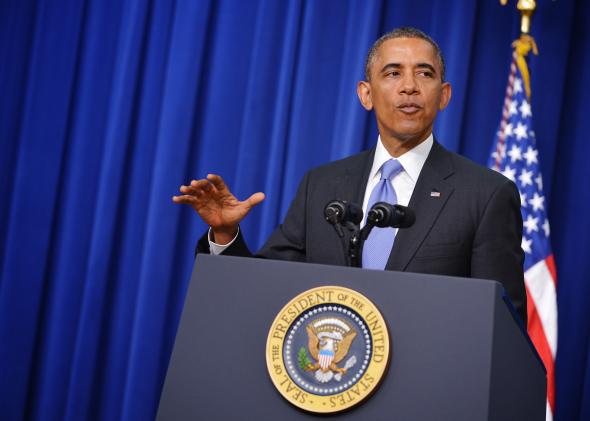The president on Friday will give a long-awaited speech addressing what he intends to do about National Security Agency surveillance programs that have come to light since June. According to press reports, his administration is still culling recommendations, and it is unclear whether he will make the most important decision of all: to no longer spy on American citizens without cause.
Between the President’s Review Group report and 30-odd pieces of legislation introduced to date, there are dozens of recommendations. But it’s essential that the administration and Congress refuse to fritter around the edges. They need to squarely take on whether we should live under secret law that allows mass domestic surveillance. It is the main thing that matters now and the only thing that will be remembered by generations to come.
These are the main points the president needs to make in his speech to bring the country’s surveillance regime back in line with the Constitution.
First, the government must end bulk collection of records and communications of both Americans and people abroad. The administration should no longer request broad court orders to collect daily information on Americans’ phone calls under Patriot Act Section 215 because the president’s review group, a federal judge, and members of Congress all found the program to be ineffective, and the privacy violations and risks of abuse are just too large. This is about much more than phone records—these tools can obtain emails, financial records, Internet records, and more. Bulk spying must also be ended under similar tools like national security letters, pen registers, and the FISA Amendments Act of 2008.
Second, there is an international human right to privacy, and the administration must vow to work with civil society, Congress, and foreign governments to determine how it applies in a world that is more digitally connected than ever before. Ordinary citizens of foreign nations who are not suspected of wrongdoing—not just their elected officials—deserve privacy in their communications.
Third, the government should promote real transparency and end secret law. In the interest of public oversight and openness, our government must inform the public and Congress about these spying programs. There must not be any secret law in the United States. While information about specific targets may remain secret, absolute secrecy prevents Americans from understanding the contours of their government’s powers. The government has to explain the scope of its authority, the nature of information collected, the number of people affected, and how collected information is used. Public oversight can be strengthened by allowing traditional public federal courts to hear cases and create more reasonable nondisclosure orders so that there is fair constitutional review.
Fourth, the NSA and other agencies must ensure the security of the Internet, not undermine it. The NSA should not be sabotaging encryption standards or breaking into company systems to collect information that would otherwise be protected by law.
Finally, we need legislative codification of these reforms. These programs began before the current administration took office and could continue if Congress does not take action. Decisions about whether we have privacy in our communications and records need to be made in public and written into law. The administration and Congress can and should work together to ensure that our spying laws return to a system based on suspicion, so that innocent Internet and phone users are not swept into vast government databases. Given the pressures of an election year, it should be a priority for the administration and Congress to pass legislation quickly.
Dragnet spying doesn’t make us safer, and it needlessly violates Americans’ privacy rights. The tide has turned. The president must now heed the growing consensus against mass spying and act decisively to end it.
